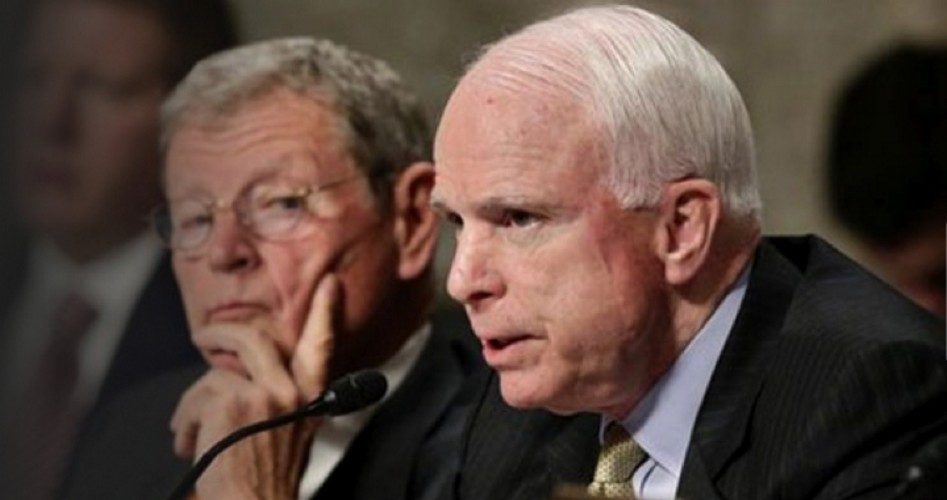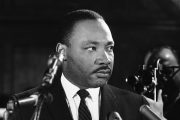
That there could be a headline reading “John McCain: Salute to a Communist” certainly is a sign of the times. It also explains why the Arizona senator is the mainstream media’s “favorite Republican.” McCain (shown on right) authored the piece, which appeared late last month in the New York Times and which eulogizes a recently deceased communist named Delmer Berg.
Why would the senator use one of the rare times he pens an article to salute a man who aided and abetted history’s most murderous ideologues? McCain explains, “‘For Whom the Bell Tolls’ was my favorite novel, and its hero, Robert Jordan, my literary idol. Like him, Delmer Berg fought in Spain, for love.” Of course, to say this of Berg definitively, the senator would have to be able to read minds and hearts; instead he just read a book. And not surprisingly, he gives us a relation of history that likewise is fiction.
Berg died February 28 as the last remaining member of the “Abraham Lincoln Brigade,” the group of nearly 3,000 mostly American volunteers fighting in the Spanish Civil War in 1937-38. Romanticizing the fighters is common among the Left, with the Times writing in its obituary for Berg that they “vainly fought against Fascism’s advance into Spain.” The paper also describes the men as “quixotic,” meaning, “marked by rash[,] lofty romantic ideas.” And that is one way to put it.
Another is that they were communists.
And Berg remained one until his death, at the age of 100.
Of course, none of this matters now because these communists fought against the man who, at the war’s conclusion in 1939, would become Spain’s supposedly fascist leader, General Francisco Franco. More on this in a moment.
Even if Franco had been a fascist, however, and even if Berg was motivated by “love,” would this warrant such laudatory treatment? It’s a given there were well-meaning people supporting the Nazis, especially early on (Jewish writer Gertrude Stein was sympathetic to them), but do they deserve exaltation for their good intentions? What is the road to Hell is paved with?
Having said this, we know that fictional character Robert Jordan was motivated by love because author Ernest Hemingway said so. But Berg lived in real life, and there was no all-knowing narrator telling his story. And there are many reasons why people fight, with hatred figuring prominently among them. What we do know is that, as the Times put it, Berg was an “unreconstructed Communist.” He was a perhaps starry-eyed 21-year-old when he saw a communist billboard for the Abraham Lincoln Brigade in 1937 and enlisted through the Young Communist League. But what explains a nigh on 100-year-old man whose grandson would say upon graduating high school, “My grandfather is my inspiration. He’s a Communist!”? This is after a century of killing fields and gulags on and in which 100 million victims died, of economies and lives ravaged time and again, of persecution and tyranny wherever Marx’ disciples held sway. Can anyone review this history with any intellectual honesty at all and not recognize communism as the great evil it is? And should those failing to do so be saluted?
San Francisco’s city fathers certainly think so. They allowed a $400,000 monument honoring the Abraham Lincoln Brigade members to be erected on public land in 2008. But while media reports of the event conveniently omitted these fighters’ Marxist stripes, John McCain did acknowledge that the International Brigades — volunteer units with thousands of members, who fought in the Spanish Civil War in 1937 and 1938 — of which the Abraham Lincoln Battalion was a part, “were organized and largely led by the Comintern, the international Communist organization controlled by the Soviets.” Of course, these men’s defenders, wrote the American Spectator in 2008, “are quick to point out that they fought fascists, but ‘fascist’ in the Communist lexicon of the 1930s was applied to everyone from Franklin Roosevelt to Leon Trotsky to Francisco Franco” (and today to conservatives, Republicans, Tea Partiers, and anyone else disagreeing with the leftist agenda). Speaking of which, McCain casually speaks of Franco’s Nationalist coalition as being led by fascists. But is this accurate? And what was Franco himself?
General Franco was a conservative monarchist; even so, he made no notable comment when King Alfonso XIII abdicated the throne in 1931. And though Franco wasn’t fond of the republican government subsequently elected into power — the majority of whose members were anti-Catholic and a plurality of whom were socialists — he said little. The general was like many military men in that he appeared non-ideological; on many issues he simply didn’t have opinions.
As for public opinion, though, it would soon turn against the new government. In May 1931, approximately 100 churches and convents were burned with the tacit approval of the government. Anti-clerical legislation was also enacted and included the nationalization of virtually all church property. Partially as a result of this, what’s viewed as a center-right coalition won the Spanish elections in the fall of 1933. This democratic determination didn’t sit well with the Left, and in 1934 a revolutionary communist/anarchist uprising was launched. Franco was placed in charge of quelling it, and did so after two weeks of heavy fighting.
But Spain was a fractured nation, with large numbers of socialists and communists and approximately a half million anarchists agitating for change. And in February 1936, the “Popular Front” leftist-coalition government attained power.
Despite its name, though, the “Popular Front was not popular,” writes American Thinker’s Bruce Walker; it lost the 1936 popular vote by more than 500,000 and only gained power due to “gross gerrymandering” and “blatantly partisan election certification.” Not that this was contrary to its pedigree, for in great part it grew out of “the Popular Front strategy at the VII Congress of the Communist International in July-August 1935,” as History Today informs; moreover, the site tells us, the new government was buttressed by the “commitment of the Communist Party.”
And this government was as radical as it sounds. It demanded public renunciation of the Catholic faith as a requirement for a civil marriage; expropriated land; and, at the Spanish Civil War’s outset, would kill priests and nuns on a massive scale (known as the Red Terror).
Now, “Those who make peaceful revolution impossible will make violent revolution inevitable,” John F. Kennedy warned. Yet Franco not only didn’t lead the military coup that would ultimately be launched in July 1936 — General Emilio Mola did — but was such a reluctant rebel that his fellow revolutionaries dubbed him “Miss Canary Islands” (referencing the location of his military post at the time). And Franco would only take the post-coup reins after Mola and another general were killed in an air crash in June 1937. To make a long story short, Franco and his Nationalists would ultimately win the war in 1939, after a bloody and brutal conflict in which a half million people died.
And what of McCain’s claim that the Nationalists were led by fascists? The Nationalist coalition comprised four groups: CEDA, a Catholic confederation devoted to opposing Marxism; the Carlists and Alfonsists, supporters of two rival royal claimants; and the Falange Party, which appeared to have been fascist — and anti-monarchist and anti-clerical. This certainly was contrary to Franco’s agenda, and in 1937, he merged the Falangists and Carlists into one movement, causing the former to complain their revolution had been indefinitely postponed. Franco also sought to transform the party, saying, “The Falange does not consider itself fascist; its founder said so personally.”
Yet Franco was given military aid by Germany and Italy during the Spanish Civil War, and much has been made of this. But as Aharon Lapid wrote at the JewishPress.com:
Franco felt no personal affinity for either Hitler or Mussolini. Franco was a devout Catholic. Hitler despised Christianity and was in thrall to pagan Teutonic religions, while Mussolini was an atheist. Franco accepted their aid only because no one else would help him — much the way Israel accepted arms from the Soviet bloc during its War of Independence because the United States and the Western European democracies had imposed a strict arms embargo.
Also note that we were allied with and aided Joseph Stalin during WWII, but that didn’t make us Marxist mass murders. Warfare makes even stranger bedfellows than does politics.
Not surprisingly, Hitler supported Franco, hoping the Spaniard would ally with Nazi Germany. He would be sorely disappointed. As Lapid also tells us:
During World War II, Franco maintained strict neutrality, denying Hitler military access to the Straits of Gibraltar and thereby severely hampering German naval operations in the Mediterranean. Franco not only stood up to Hitler and adamantly refused to hand over the approximately 40,000 European Jews who had sought refuge in Spain, he also provided protection for Jews in Nazi-occupied Eastern Europe with Spanish passports.
Moreover, the writer points out that Spain “was in significant danger of becoming the first communist state outside the Soviet Union (located in Western Europe, no less). And that is precisely what would have happened had Franco not seized power” — and if Delmer Berg had gotten his way.
In other words, Franco perhaps was a “maverick,” something John McCain has long pretended to be. For a true maverick today might understand that, as Lapid put it, “President Lincoln would turn over in his grave at the mere thought of his name being associated with the Stalinist Abraham Lincoln Brigade.”
No doubt. And we can only hope that, one day, the bell will toll for fiction feigning fact status and revisionist history masquerading as reality.



